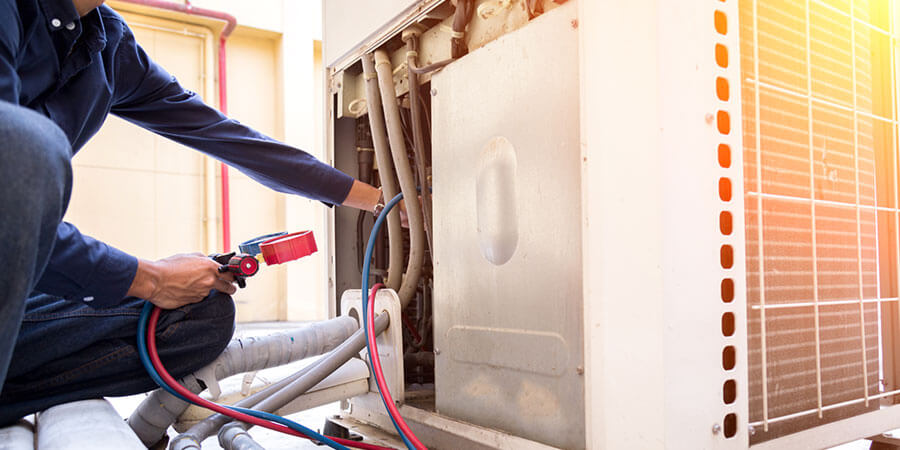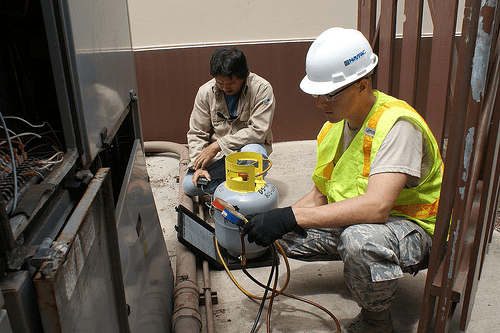Signs Your Home Needs Immediate heat pump service
Signs Your Home Needs Immediate heat pump service
Blog Article
Selecting Between a Warm Pump and Furnace: Trick Factors To Consider for Your HVAC Needs
When reviewing home heating choices for heating and cooling needs, the decision between a warmth pump and a heating system can be complicated. Each system provides distinct benefits tailored to details environments and energy performance objectives. Understanding these distinctions is important for making an enlightened option. Key variables such as setup expenses and ecological effect even more make complex the selection procedure. Which alternative really straightens with one's comfort and sustainability choices? The adhering to sections will discover these considerations thoroughly.
Understanding Warmth Pumps: How They Function and Their Advantages
While lots of homeowners take into consideration different home heating options, recognizing how warm pumps function and their advantages can substantially affect their decision. Warmth pumps operate by moving warmth rather than producing it. In the winter, they draw out warm from the outdoors air or ground and transfer it indoors, while in the summertime, they reverse this procedure, cooling the home by getting rid of warmth outside. This dual performance makes them functional for year-round climate control.One of the main advantages of warm pumps is their power efficiency. They utilize considerably less electrical power compared to typical heating unit, potentially leading to reduced energy costs (ductless mini splits). Additionally, heatpump have a smaller sized carbon impact, making them an eco-friendly selection. They additionally call for much less upkeep than standard systems, contributing to long-term cost savings. Generally, understanding the technicians and advantages of heat pumps can help property owners make notified decisions regarding their heating and cooling demands
Discovering Heaters: Kinds, Operation, and Advantages
Furnaces come in numerous kinds, including gas, electric, and oil models, each with distinctive functional systems. Comprehending these differences is crucial, as they influence efficiency and home heating efficiency. Additionally, furnaces offer various advantages, such as consistent warm result and integrity in chillier climates.
Kinds of Heating systems
Heating systems can vary substantially in style and operation, with heaters being a preferred option amongst homeowners. There are a number of sorts of heaters, each making use of different fuel resources and innovations. Gas furnaces prevail, leveraging all-natural gas to produce warmth effectively. Electric heaters, on the other hand, utilize electrical resistance to generate heat, typically favored for their simple installation. Oil heaters, while less typical, are effective in locations with limited gas accessibility (heat pump service). In addition, condensing furnaces make the most of power performance by reusing and recording exhaust gases. Each kind runs with a system of warm exchangers and ductwork to disperse cozy air throughout a home. Recognizing the distinctions in between these heater types is necessary for informed a/c choices
Benefits of Heating systems
For home owners seeking reputable heat throughout cold months, the benefits of furnaces are substantial. Heaters offer constant home heating, making certain even temperatures throughout the home. They are particularly reliable in extreme cold, typically outshining heatpump in cold conditions. Different kinds, consisting of gas, electrical, and oil furnaces, supply flexibility to satisfy varied needs and preferences.Furnaces also often tend to have reduced first setup costs compared to warmth pumps, making them a much more available alternative for many. Their durable style adds to a much longer lifespan, with several units lasting over 15 years with proper maintenance. In addition, modern heaters are typically furnished with innovative technology for improved performance, which can lead to lowered energy expenses. Generally, heaters remain a dependable option for effective home heating.

Power Efficiency: Comparing Heat Pumps and Furnaces
When contrasting energy effectiveness in between heatpump and heaters, the Seasonal Energy Performance Proportion (SEER) plays an important duty in figuring out performance. Furthermore, an operational price evaluation reveals the long-lasting monetary ramifications of each system. Comprehending these factors can assist homeowners in making informed decisions concerning their heating solutions.
Seasonal Energy Effectiveness Proportion
Power effectiveness plays a necessary role in the decision-making procedure between heat pumps and heating systems, particularly when considering the Seasonal Power Effectiveness Ratio (SEER) This statistics measures the cooling effectiveness of heatpump over a whole cooling season, offering a standard means to review efficiency. Greater SEER rankings show better power performance, converting to reduced power intake and minimized utility expenses. In comparison, heaters are usually analyzed using the Yearly Fuel Use Effectiveness (AFUE) rating, which reflects heating effectiveness. When comparing these two systems, homeowners need to prioritize SEER scores for warmth pumps, as they straight influence general energy savings and ecological sustainability. A detailed understanding of SEER can especially influence the long-lasting fulfillment and cost-effectiveness of the chosen a/c remedy.
Functional Expense Analysis
Understanding the operational prices connected with warmth pumps and heaters is important for homeowners assessing their options. Warmth pumps usually offer greater energy performance, converting electrical energy right into warmth with marginal waste. This leads to reduced regular monthly energy costs, particularly in moderate climates. Conversely, typical this content furnaces, especially gas models, might have lower upfront prices but can sustain greater operational costs over time because of sustain prices and effectiveness ratings.Moreover, heatpump can operate as both heating and cooling down systems, possibly decreasing the requirement for different cooling and heating devices. While preliminary investments for heatpump may be higher, their lasting financial savings in energy performance can make them a more cost-efficient choice for lots of right here households. Cautious evaluation of neighborhood power rates is important to identify the very best option.
Setup Expenses: What to Anticipate for each and every Home Heating System
Installation costs for furnace can vary significantly in between warmth pumps and furnaces, influencing property owners' decisions. Warm pumps normally have greater in advance setup expenses, generally ranging from $3,500 to $8,000, depending upon the system dimension and intricacy of installment. This consists of the exterior system, indoor handling system, and necessary ductwork modifications. Conversely, furnaces tend to have lower first costs, balancing between $2,500 and $6,000, which can be appealing for budget-conscious homeowners. Installment costs can enhance if extensive ductwork is required.Moreover, the choice of gas type for furnaces-- all-natural gas, lp, or electrical-- can additionally affect installation prices. While heatpump provide energy performance, their preliminary investment might prevent some buyers. Inevitably, examining installation prices along with lasting cost savings and effectiveness will certainly assist homeowners in making notified decisions regarding their home heating systems.
Climate Factors To Consider: Which System Performs Much Better in Your Location
Just how do environment conditions influence the efficiency of heating unit? The performance of heatpump and heating systems can vary substantially depending on the regional climate. In moderate environments, heatpump stand out by efficiently transferring warm from the outside air, making them an energy-saving choice. Their effectiveness lessens in extremely chilly temperature levels, where they might struggle to draw out adequate warm. Conversely, heating systems, especially gas versions, give trusted and constant warm no matter of exterior conditions, making them more suitable in chillier regions.In areas that experience milder winters, heatpump can operate successfully year-round, giving both heating and cooling. On the other hand, areas with harsh winters months typically benefit from the toughness of furnaces. Eventually, comprehending the neighborhood environment is necessary when determining in between a heatpump and a heating system, as it directly affects their operational efficiency and overall performance.
Maintenance Requirements: Long-Term Care for Warm Pumps vs. Furnaces
While both heatpump and furnaces need normal upkeep to assure peak efficiency, their specific demands and treatment routines vary significantly. Furnaces typically require less constant interest, with yearly evaluations being enough to examine for gas leaks, tidy filters, and evaluate total performance. Their simpler style frequently permits uncomplicated repairs.In contrast, warmth pumps require semiannual upkeep because of their double function in heating & cooling. This consists of cleansing coils, inspecting refrigerant levels, and making sure that both the indoor and outside systems function at their finest. In addition, heat pump upkeep usually entails more elaborate components, making professional maintenance essential.Neglecting maintenance can lead to reduced efficiency and enhanced energy prices for both systems. Ultimately, house owners need to think about these long-lasting treatment needs when choosing between a heatpump and a heater, as proactive maintenance can expand the life expectancy and performance of either system significantly.
Ecological Impact: Picking a Lasting Home Heating Alternative
The environmental impact of heating unit is a crucial analysis for property owners looking for sustainable alternatives. Heatpump navigate to this site are normally much more energy-efficient than traditional heating systems, as they move heat as opposed to produce it, greatly minimizing carbon exhausts. By making use of eco-friendly power resources, such as air-source or geothermal warm pumps, house owners can additionally minimize their environmental footprint.On the various other hand, gas heaters emit greenhouse gases and add to air contamination, though they frequently provide greater warmth outcome. Advancements in modern technology have led to the development of high-efficiency heating systems that reduce emissions.Ultimately, picking a heating system involves evaluating efficiency versus ecological influence. Homeowners are encouraged to assess neighborhood energy resources and rewards for sustainable systems, making certain a selection that straightens with both individual convenience and ecological responsibility. The decision impacts not only prompt comfort yet also lasting sustainability and environmental health and wellness.
Frequently Asked Concerns
How Much Time Do Warmth Pumps and Furnaces Normally Last?
The lifespan of heatpump generally varies from 15 to two decades, while heating systems can last in between 15 to 30 years. Regular upkeep substantially impacts their long life and performance in offering home heating solutions.
Can I Utilize a Warmth Pump in Extremely Cold Climates?
Warm pumps can run in incredibly chilly climates, however their efficiency diminishes as temperatures decline. In such conditions, supplementary heating resources may be required to maintain comfy interior temperature levels and guarantee peak performance.

What Is the Sound Degree of Warmth Pumps Versus Furnaces?
The sound degrees of heatpump and heating systems differ substantially. Normally, heatpump run more silently than traditional heaters, making them more effective for those conscious appear, while heating systems might create louder operational noises throughout heating cycles.
Are Warmth Pumps Suitable for Both Heating & Cooling?
Heatpump are indeed suitable for both home heating and air conditioning (heat pump installation ooltewah tn). They operate by moving warm, offering efficient temperature level control year-round, making them a flexible choice for home owners seeking an all-in-one cooling and heating service
What Dimension Heating System Do I Required for My Home?
Determining the ideal dimension heating unit for a home requires evaluating aspects such as square video footage, insulation quality, neighborhood environment, and the home's format. Consulting an expert can ensure a precise evaluation and optimal convenience. Warmth pumps usually offer greater energy effectiveness, converting electric energy right into warm with marginal waste. In modest environments, heat pumps excel by effectively transferring warm from the outside air, making them an energy-saving choice. Alternatively, heaters, specifically gas models, provide trustworthy and regular heat regardless of outdoor conditions, making them more suitable in colder regions.In areas that experience milder winters, heat pumps can operate effectively year-round, providing both heating and cooling. Heat pumps are generally much more energy-efficient than traditional furnaces, as they transfer warmth instead than create it, substantially lowering carbon exhausts. By making use of renewable power resources, such as air-source or geothermal heat pumps, homeowners can further lessen their ecological footprint.On the various other hand, natural gas furnaces produce greenhouse gases and contribute to air pollution, though they commonly give greater warmth result.
Report this page